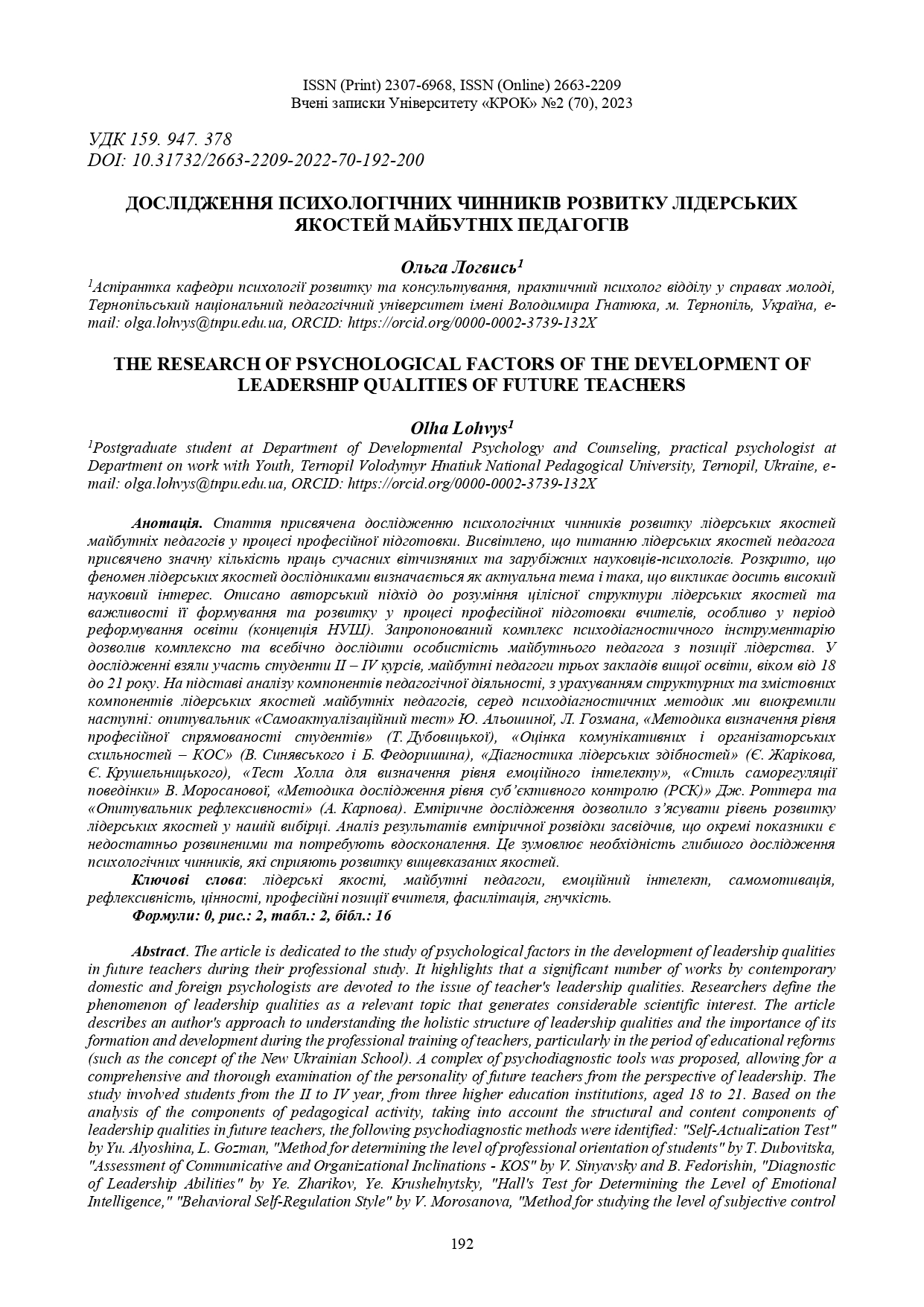THE RESEARCH OF PSYCHOLOGICAL FACTORS OF THE DEVELOPMENT OF LEADERSHIP QUALITIES OF FUTURE TEACHERS
DOI:
https://doi.org/10.31732/2663-2209-2022-70-192-200Keywords:
leadership qualities, teachers, emotional intelligence, self-motivation, reflexivity, values, teacher's professional positions, facilitation, flexibilityAbstract
The article is dedicated to the study of psychological factors in the development of leadership qualities in future teachers during their professional study. It highlights that a significant number of works by contemporary domestic and foreign psychologists are devoted to the issue of teacher's leadership qualities. Researchers define the phenomenon of leadership qualities as a relevant topic that generates considerable scientific interest. The article describes an author's approach to understanding the holistic structure of leadership qualities and the importance of its formation and development during the professional training of teachers, particularly in the period of educational reforms (such as the concept of the New Ukrainian School). A complex of psychodiagnostic tools was proposed, allowing for a comprehensive and thorough examination of the personality of future teachers from the perspective of leadership. The study involved students from the II to IV year, from three higher education institutions, aged 18 to 21. Based on the analysis of the components of pedagogical activity, taking into account the structural and content components of leadership qualities in future teachers, the following psychodiagnostic methods were identified: "Self-Actualization Test" by Yu. Alyoshina, L. Gozman, "Method for determining the level of professional orientation of students" by T. Dubovitska, "Assessment of Communicative and Organizational Inclinations - KOS" by V. Sinyavsky and B. Fedorishin, "Diagnostic of Leadership Abilities" by Ye. Zharikov, Ye. Krushelnytsky, "Hall's Test for Determining the Level of Emotional Intelligence," "Behavioral Self-Regulation Style" by V. Morosanova, "Method for studying the level of subjective control (RSC)" by J. Rotter, and the "Questionnaire on reflexivity" by A. Karpova. The empirical study allowed for determining the level of development of leadership qualities in the selected sample. The analysis of the empirical research results revealed that certain indicators are underdeveloped and require improvement. This necessitates further research into the psychological factors that contribute to the development of the aforementioned qualities.
Downloads
References
Професійний розвиток педагога в світлі євроінтеграційних процесів: колективна монографія / за наук. ред. проф. Цвєткової Ганни. Hameln : InterGING, 2019. 557 с.
Дубяга С. М. Лідерські якості майбутнього вчителя у контексті сучасної освіти // Науковий вісник Мелітопольського державного педагогічного університету: зб. наук. статей / редкол.: І. П. Аносов (голов. ред.) та ін. Мелітополь. 2010. Вип. 5. С. 174 –175.
Калашнікова С. А. Освітня парадигма професіоналізації управління на засадах лідерства : монографія / С А. Калашнікова. К. : Київськ. ун-т імені Бориса Грінченка, 2010. 380 с.
Карамушка, Л.М. Лідерство в організації: аналіз основних підходів та важливість їх застосування в організаціях системи вищої освіти / Л.М. Карамушка, Т.Г. Фелькель // Проблеми сучасної психології. 2013. № 2. С. 52-60
Мараховська Н. В. Педагогічні умови формування лідерських якостей майбутніх учителів у процесі навчання дисциплін гуманітарного циклу: автореф. дис. на здобуття наук. ступеня канд. пед. наук: спец. 13.00.04. «Теорія і методика професійної освіти» / Н. В. Мараховська. Х., 2009. 155 с.
Семченко Н.О. Педагогічні умови формування лідерських якостей майбутніх учителів у позааудиторній діяльності :дис.канд. пед. наук : 13.00.04 / Н.О. Семченко. Х., 2005. 215 с.
Татенко В.О. ЛІДЕР ХХІ / LIDER ХХІ. Соціально-психологічні студії. К.: Видавничий дім "КОРПОРАЦІЯ", 2004. 182 с.
Сингаївська І. В. Психологічні особливості узгодження особистісних і суспільних вимог до професійної успішності викладача. Проблеми сучасної психології. Кам’янець-Подільський: Кам’янець-Подільський національний університет імені Івана Огієнка. Вип. 30. 2015. с. 574–588.
Goleman, D., Boyatzis, R., & McKee, A. (2001). “Primal leadership: The hidden driver of leadership. Harvard Business Review, December. (To get free access, you have to register with HBR)
Greenlee, B. J. (2007). Building teacher leadership capacity through educational leadership programs. Journal of Research for Educational Leaders, 4(1), 44-74.
York-Barr, J., & Duke, K. (2004). What do we know about teacher leadership?Findings from two decades of scholarship. Review of Educational Research, 74(3), 255-346. Retrieved on March 12, 2009, from http://www.jstor.org/pss/3516026
Гоулман Д., Бояціс Р., Маккі Е. Емоційний інтелект лідера. Наш формат, 288 с.
Радчук Г. К., Логвись О. Я. Лідерські якості в цілісній структурі особистості педагога. Науковий вісник Херсонського державного університету. Серія Психологічні науки. 3. 2021. С. 93–100.
Кокун О.М., Пішко І.О., Лозінська Н.С., Копаниця О.В., Герасименко М.В., Ткаченко В.В. Збірник методик діагностики лідерських якостей курсантського, сержантського та офіцерського складу: Методичний посібник. К.: НДЦ ГП ЗСУ, 2012. 433 с.
Лідерські якості в професійній діяльності / Романовський О. Г., Резнік С. М., Гура Т.В., Панфілов Ю.І, Головешко Б.Р., Бондаренко В.В., за заг. ред. О. Г. Романовського. Харків: НТУ»ХПІ», 2017. 143 с.
Радчук Г. К. Аксіопсихологія вищої школи. Монографія. Тернопіль: ТНПУ, 2014. 380 с.

Downloads
Published
How to Cite
Issue
Section
License

This work is licensed under a Creative Commons Attribution-NonCommercial 4.0 International License.

